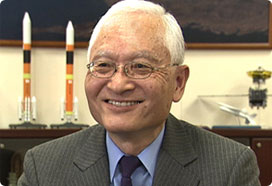
Q. How would you like to position JAXA internationally?
International cooperation is inevitable in space development. We have worked with other countries in the area of space science, including the ISS project, and hope to further the spirit of collaboration in lunar and planetary exploration. By finding and enhancing Japan’s strengths, we wish to contribute to the world.
Also, since we want our societies to benefit from space utilization, it is important to make good use of the Sentinel Asia program launched last year, using ALOS data. Frequent natural disasters are obviously not welcomed, but in such cases we’d like to use satellite information and make continuous improvements in disaster response. India and Korea have joined us to provide their satellite data, so we’ll ensure its efficient use for disaster monitoring.
In aviation, I think we should work with other countries on projects such as transport development, and I’d like Japan to be able to play a central role in such programs.
Q. What do you think about Japan’s space policy?
Among the five primary countries that are involved in space development, I always thought that Japan was the only one that had not clarified its national space policy. However, House members finally formulated basic space legislation last year, creating the climate for the development of the nation’s space policy. The space bill will reportedly be submitted soon to the Diet, and I hope that this will clarify space policy at the governmental level, which will also facilitate the operation of JAXA as an executive agency. I do hope the bill will pass.
Q. What would you like to reform this year?

I think progress was made on management reform at JAXA last year, so I’d like to see that implemented. Furthermore, we must continue awareness-raising among the staff. I’m not saying that the conventional way of doing things is bad, but we have entered a new era, in which, for instance, Japan’s finances do not allow us to make sudden leaps, but instead require incremental growth. In such circumstances, I think it necessary to alter people’s perception of how to make progress in space development. We must all think not only about development but also about utilization and contribution, which should be followed by cost-awareness.
Having said that, while working on these aspects, we must always remember that JAXA is an exploration agency. Research and development are our primary function. Therefore, we should be conducting as wide a range of research as possible. Unless we achieve new results, there is no point. To do so we need to continue to carry out research, and I think that basic research is particularly important. Although you cannot expect instant results, it’s important to continue basic research, because this will eventually generate something interesting and worthy. The private sector spends 5 to 10 per cent of its overall R&D budget on basic research, and I’d like to see that figure at about 5 per cent at JAXA. Investment in R&D tends to be cut when the economy is not healthy. But good leaders would reform their companies by reducing unnecessary expenses, not research and development costs.
JAXA will focus on research and development, as it is expected to do. I am sure this will bear fruit in the future.
| 1 2 3 4 |